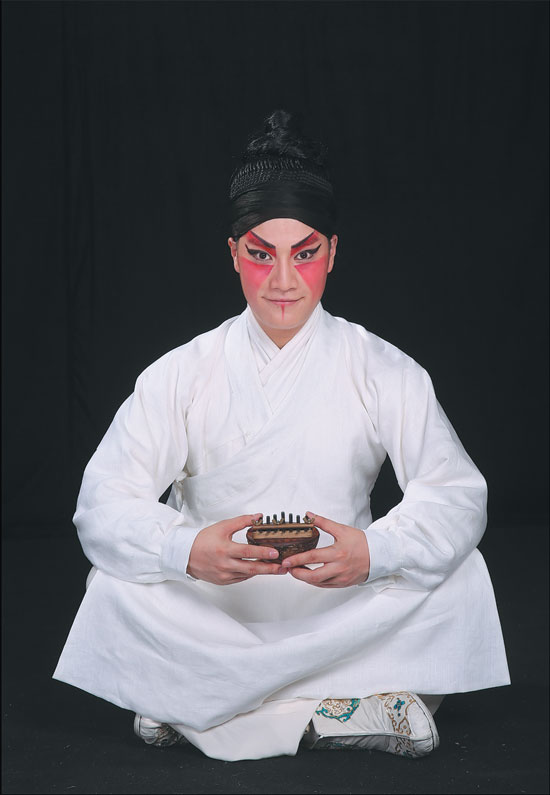Theater talent on show in capital
By Chen Nan (China Daily) Updated: 2017-09-06 07:59A play combining traditional operas, hip-hop and a folk band, will be staged at the National Small Theater Festival. Chen Nan reports.
About two years ago, when Hu Hanchi, who was studying at the National Academy of Chinese Theater Arts, decided to make his directorial debut, he chose San Sheng (literally meaning Three Lives), a story from Liaozhai Zhiyi, or Strange Tales From a Chinese Studio, a collection of supernatural tales by Pu Songling in the Qing Dynasty (1644-1911).
"The story is simple, clear and made me think," says Hu, 27.
|
Hu Hanchi, a young director and actor, blends the essence of traditional Chinese operas, hip-hop and live music into plays. Photos Provided to China Daily |
However, he didn't want to copy the original.
He spent eight months rewriting the script.
To save money, he also directed and played all the four roles in the play - a young scholar, a dog, a horse and a snake.
In July 2016, the play, The Wheel of Time, based on Pu's original story, premiered at the theater of the National Academy of Chinese Theater Arts.
So far, it has been staged 10 times across the country.
Over Sept 16-17, The Wheel of Time will be staged at the Star Theater in Beijing.
In the story, a man is punished by the King of Hell for doing bad things.
Then, he reincarnates into a dog, a horse and a snake for three lives.
In the one-man show, Hu plays a young poor scholar, who shelters in an abandoned temple on a rainy night.
In his sleep, he dreams about a dog, a horse and a snake.
The three animals all die in his dream and he tries to save them.
"We ask lots of questions in this play. We don't find the answers and we hope the audience can find their own answers," says Hu.
His friend, Zhang Cheng, who is also a student of National Academy of Chinese Theater Arts, co-wrote the script.
The 75-minute play combines Kunqu Opera, Peking Opera, hip-hop music and a live band comprising two members, Chen Yuxiao and He Zichen.
For each of the roles, Hu employs different techniques from traditional Chinese opera.
For example, to portray the role of snake, he uses the dan (female role) technique, while to depict the horse, he uses wusheng, a male martial character in Peking Opera.
Hu says that he was also inspired by Taiwan Peking Opera artist Wu Hsing-kuo's one-man adaptation of William Shakespeare's tragedy, King Lear.
"When I met Wu in Beijing last year, he told me that courage is vital for people working in theater," says Hu.
"I have always wanted to do something different, and the experience of making The Wheel of Time has let me fulfill my dream."
The Wheel of Time is part of the ongoing National Small Theater Festival, which runs through September.
The festival will see the staging of 21 original Chinese theater productions in Beijing.
Hu, who was born and raised in Hangzhou, Zhejiang province, has moved away from his family tradition.
His parents are all Kunqu Opera actors at the Zhejiang Kunqu Opera Art Theater.
In high school, Hu fell in love with hip-hop music.
And he persisted with this although his father was against it.
Then, as he grew up, Hu realized that he loved traditional Chinese opera.
So, he chose at the National Academy of Chinese Theater Arts to study.
"Though I did not attend traditional opera school like my parents, I learned from them at home - the singing, the physical movements," says Hu.
He obtained his bachelor's degree from the National Academy of Chinese Theater Arts in 2012.
He later worked as an actor at a Beijing-based independent theater company.
In 2016, when The Wheel of Time was staged in Beijing, Hu's father, Hu Jianhua, watched his son's performance.
"It was the first time I was watching him perform. Though the play has a variety of elements, both traditional and contemporary, from the first score, I knew it is Kunqu Opera," says his father, Hu Jianhua.
"What surprised me the most was his singing. He never learned Kunqu Opera or Peking Opera but his interpretation is great."
Hu Hanchi is now working on his second directorial work, Delivery of Ghost, which is scheduled to open toward the end of the year.
In this new play, he combines traditional Chinese opera with physical theater, a genre that encompasses storytelling primarily through physical movement.
Contact the writer at chennan@chinadaily.com.cn
- 'Cooperation is complementary'
- Worldwide manhunt nets 50th fugitive
- China-Japan meet seeks cooperation
- Agency ensuring natural gas supply
- Global manhunt sees China catch its 50th fugitive
- Call for 'Red Boat Spirit' a noble goal, official says
- China 'open to world' of foreign talent
- Free trade studies agreed on as Li meets with Canadian PM Trudeau
- Emojis on austerity rules from top anti-graft authority go viral
- Xi: All aboard internet express












